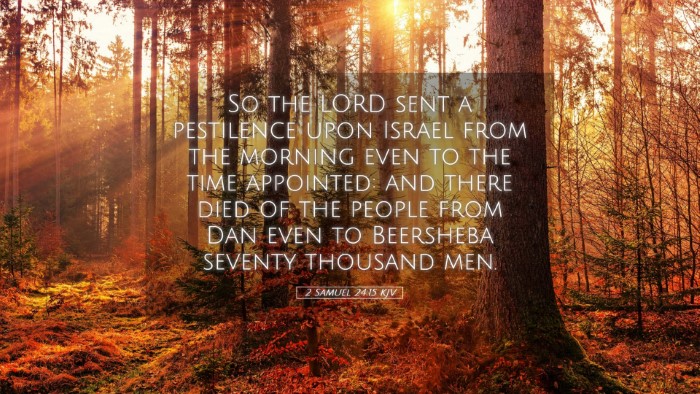Commentary on 2 Samuel 24:15
Biblical Context: In 2 Samuel 24, we find the account of King David's census of Israel, which incited the anger of the Lord. As a result, God offered David three choices of punishment, from which David chose a plague that resulted in a significant loss of life among the Israelites.
Verse Analysis
2 Samuel 24:15 (ESV): "So the LORD sent a pestilence on Israel from the morning until the appointed time. And there died of the people from Dan to Beersheba seventy thousand men."
Commentary Insights
This verse details the severity of God's judgment upon Israel due to David's sin in conducting a census that was driven by pride rather than reliance on God. The theological implications and reflections upon human sin, divine judgment, and God's mercy are profound.
Matthew Henry's Commentary
According to Matthew Henry, this event underscores the gravity of David's transgression. David's decision to take a census represented a lack of faith in God's ability to provide for and protect His people. Henry emphasizes that this action was not merely a simple act of counting but indicated a deeper issue of reliance on military strength rather than divine providence.
Henry points out that the pestilence sent by the Lord is a tangible manifestation of divine displeasure, illustrating how sin can invoke serious consequences. This judgment resulted in the death of seventy thousand men, highlighting the collective impact of one man's sin on the nation.
Albert Barnes' Notes
Albert Barnes expands upon the implications of the pestilence. He notes that the choice of punishment reflects not just the consequences of sin but also the nature of God's sovereignty. Barnes suggests that the "appointed time" mentioned in the verse was likely limited by God’s mercy. This notion of an appointed time speaks to the divine order whereby God's judgments are not capricious but measured and purposeful.
Furthermore, Barnes reflects upon the geographical mention of "from Dan to Beersheba," emphasizing the widespread effect of the pestilence across all Israel, symbolizing the comprehensive nature of God's judgment and the seriousness of national sin.
Adam Clarke's Commentary
Adam Clarke elaborates on the theological implications of divine punishment in this passage. He comments on the phrase "the Lord sent a pestilence," noting that this emphasizes the direct action of God in the affairs of humanity. Clarke asserts that such actions are a reminder of God's authority and control over life, death, and the conditions of prosperity and adversity.
Clarke also reflects on the number of deaths—seventy thousand—which serves as a stark reminder of the devastation that can result from divine judgment. He interprets this as both a warning and a call to repentance, encouraging readers to understand the gravity of disobedience to God.
Theological Implications
- Human Responsibility: This passage illustrates the weight of responsibility that leaders carry. David's actions led to widespread consequences, reminding pastors and leaders of their accountability.
- Divine Judgment: The pestilence signifies that God takes sin seriously. The text serves as a sober reminder for believers to reflect on their actions and the impact they have on their community.
- God's Mercy Amidst Judgment: Even in judgment, God's mercy is evident. The idea of an "appointed time" as suggested by Barnes indicates God's desire for the restoration of relationship with His people.
Application for Pastors and Theologians
For contemporary pastors and theologians, the insights derived from this passage can be applied in various ways:
- Leadership & Accountability: Reflect on how leadership choices affect congregational well-being.
- Understanding Divine Sovereignty: Recognize the importance of emphasizing God's sovereignty in teaching and ministry.
- Calls to Repentance: Utilize this passage to encourage congregations towards penitence and a deeper reliance on God’s grace.
Conclusion
The narrative presented in 2 Samuel 24:15 serves as a profound exploration of sin's consequences, divine judgment, and the call for national and personal repentance. As seen through the lenses of Henry, Barnes, and Clarke, the depth of this passage prompts significant theological reflection and practical application for today's readers, particularly for those tasked with shepherding others in faith.


